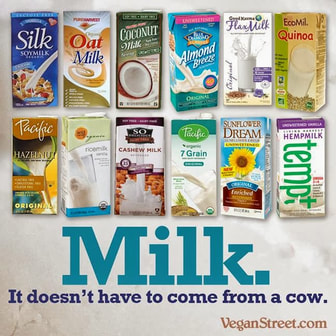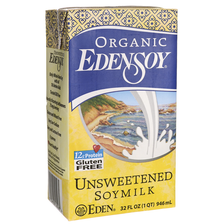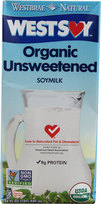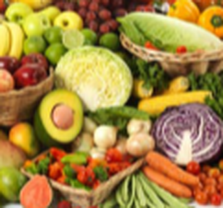
I do love the work of both Dr. T Colin Campbell and his Son Dr. Thomas Campbell. I believe my life, and health have benefitted immensely from my knowledge of their work, and I am a regular subscriber to their newsletter, published by the Center for Nutrition Studies. So it was with great interest that I read their article, "A Plant Based Doctor's Take on Choosing a Plant-Based Milk." However I found this article to be incomplete in addressing the wide variety of health concerns that are relevant to such a discussion. So this blog post is not only to honor their work, but expand upon this subject a bit more.
There are many good reasons to leave all dairy products out of your diet. Dairy proteins stimulate the growth of existing cancers, trigger damage to arteries, and trigger Type One Diabetes in genetically susceptible people. Dairy products are loaded with artery clogging saturated fat, and trans-fats, and they contain dozens of hormones, which increase acne and can disrupt our own hormone balance. They are rich sources of environmental contaminants that animal's concentrate in their body and only release these when lactating. Dairy is loaded with pus, and often contains pathogens, not killed by pasteurization -- such as the MAP bacteria, which may trigger Crohn's Disease, and bovine leukemia viruses, which are suspected as a cause of leukemia and breast cancer in humans.
Given the overwhelming science showing multiple harms from dairy, it makes sense to find plant based alternatives to all dairy products (I have an entire page HERE dedicated to just that) however Campbells's article really only addressed the fat, sugar and calorie content of plant-milks, and I have additional concerns:
1) Most plant-milks have added calcium. This is no different than taking a calcium supplement, and the most recent research shows that calcium supplements are associated with increased mortality -- probably by contributing to calcification of the arteries. I'd suggest avoiding the milks with added calcium.
2) Many plant milks also have added chemicals (like carrageenan) which may have some harmful impacts. I recommend avoiding these too. Look for labels that list very few ingredients.
3) Almond milk has some additional concerns. The California Almond Board requires almonds to be pastueurized either by steam or treatment with Propylene Oxide (PPO) a possible carcinogen. I suggest avoiding PPO. You can call the manufacturer to determine which method was used on the almonds in your milk, or buy organic. Natural Grocer's has a statement on this subject too.
4) Because soy is likely to be Genetically modified, which means it could detrimentally alter our gut micro biome, and or have much higher levels of Round-up, and or high levels of BT-toxin, I recommend avoiding soy like the plague -- unless it is certified non-GMO project verified.
5) Some milks are sweetened with barley malt, or have other ingredients that contain gluten -- so I look for those that are gluten-free as well.
Here are examples of soy milks that I buy for my family:
There are many good reasons to leave all dairy products out of your diet. Dairy proteins stimulate the growth of existing cancers, trigger damage to arteries, and trigger Type One Diabetes in genetically susceptible people. Dairy products are loaded with artery clogging saturated fat, and trans-fats, and they contain dozens of hormones, which increase acne and can disrupt our own hormone balance. They are rich sources of environmental contaminants that animal's concentrate in their body and only release these when lactating. Dairy is loaded with pus, and often contains pathogens, not killed by pasteurization -- such as the MAP bacteria, which may trigger Crohn's Disease, and bovine leukemia viruses, which are suspected as a cause of leukemia and breast cancer in humans.
Given the overwhelming science showing multiple harms from dairy, it makes sense to find plant based alternatives to all dairy products (I have an entire page HERE dedicated to just that) however Campbells's article really only addressed the fat, sugar and calorie content of plant-milks, and I have additional concerns:
1) Most plant-milks have added calcium. This is no different than taking a calcium supplement, and the most recent research shows that calcium supplements are associated with increased mortality -- probably by contributing to calcification of the arteries. I'd suggest avoiding the milks with added calcium.
2) Many plant milks also have added chemicals (like carrageenan) which may have some harmful impacts. I recommend avoiding these too. Look for labels that list very few ingredients.
3) Almond milk has some additional concerns. The California Almond Board requires almonds to be pastueurized either by steam or treatment with Propylene Oxide (PPO) a possible carcinogen. I suggest avoiding PPO. You can call the manufacturer to determine which method was used on the almonds in your milk, or buy organic. Natural Grocer's has a statement on this subject too.
4) Because soy is likely to be Genetically modified, which means it could detrimentally alter our gut micro biome, and or have much higher levels of Round-up, and or high levels of BT-toxin, I recommend avoiding soy like the plague -- unless it is certified non-GMO project verified.
5) Some milks are sweetened with barley malt, or have other ingredients that contain gluten -- so I look for those that are gluten-free as well.
Here are examples of soy milks that I buy for my family:
And while I do keep packaged soy milk on hand -- most of the time when I need milk, I make my own from almonds, cashews or sunflower seeds. It's very simple, quick and saves me money. See my post right below this one to learn how.



